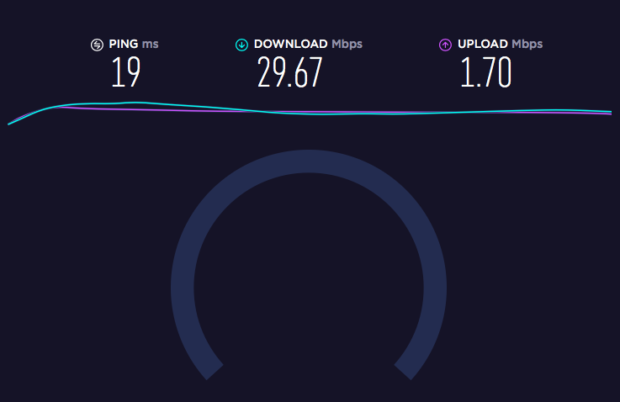
Sample speedtest by Ookla as of June 18, 2021
MANILA, Philippines — The average internet speeds in the Philippines — for both mobile internet and fixed broadband — have increased again for the month of May, international monitoring group Speedtest by Ookla said.
In the latest Global Index, Speedtest data showed that the Philippines’ mobile average download speeds were at 31.98 Megabits per second (Mbps), placing 77th out of 137 countries. This was also seven spots up compared to its previous status in April.
In terms of fixed broadband where the country made significant strides, according to Speedtest numbers, the country is now ranked 65th across the world with its average download speeds of 59.73, which is 15 places higher than the previous month’s ranking.
According to the National Telecommunications Commission (NTC), the improvement was the third-best globally for both categories.
“Only last November 2020, the country’s average download speeds for fixed broadband ranked 103rd and 110th for mobile globally. The significant progress in ranking the past months is due primarily to the Duterte government’s all-out support in expediting the release of LGU permits required for the fast-tracking of improvement of telco infrastructure,” NTC said.
Compared to May, April’s scores were far lower: mobile internet had an average download speed of 29.12 Mbps, while fixed broadband connections tallied an average speed of 49.31 Mbps.
It was even farther from data garnered last March, where mobile internet and fixed broadband were at 25.43 Mbps and 46.25 Mbps, respectively.
According to NTC, speeds are set to go higher as the government looks to fast-track the roll-out of telecommunication companies’ infrastructure, which would urge local government units to comply with the Joint Memorandum Circular (JMC) signed by the Department of Information and Communications Technology, Department of Interior and Local Government, Anti-Red Tape Authority, and other government agencies.
“The National Telecommunications Commission, PLDT, Globe, Converge and DITO also welcomed the Department of Public Works and Highways (DPWH) initiative to allow telecommunication companies to occupy a portion of the government’s Right of Way (ROW) as part of the government’s thrust to ensure internet connectivity throughout the country,” NTC said.
“The new DPWH directive will help speed up implementation of telco infrastructure projects especially along national roads. With the country’s third major telco, DITO Telecommunity, now present in 100 cities all throughout the Philippines, incumbents Globe and Smart increased their capital expenditures this year,” it added.